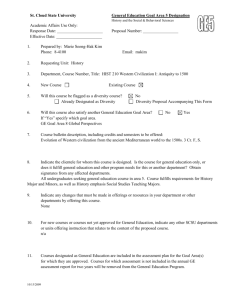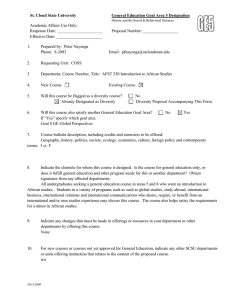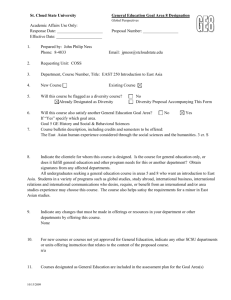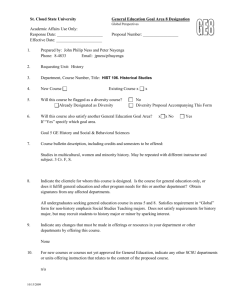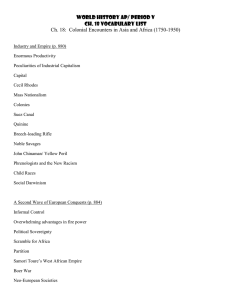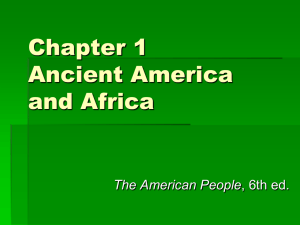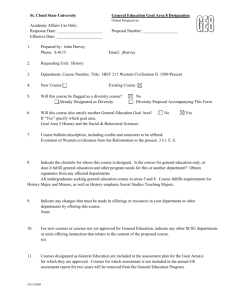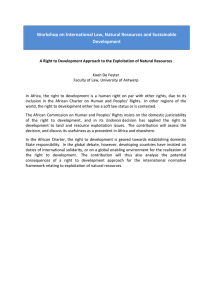St. Cloud State University General Education Goal Area 8 Designation
advertisement
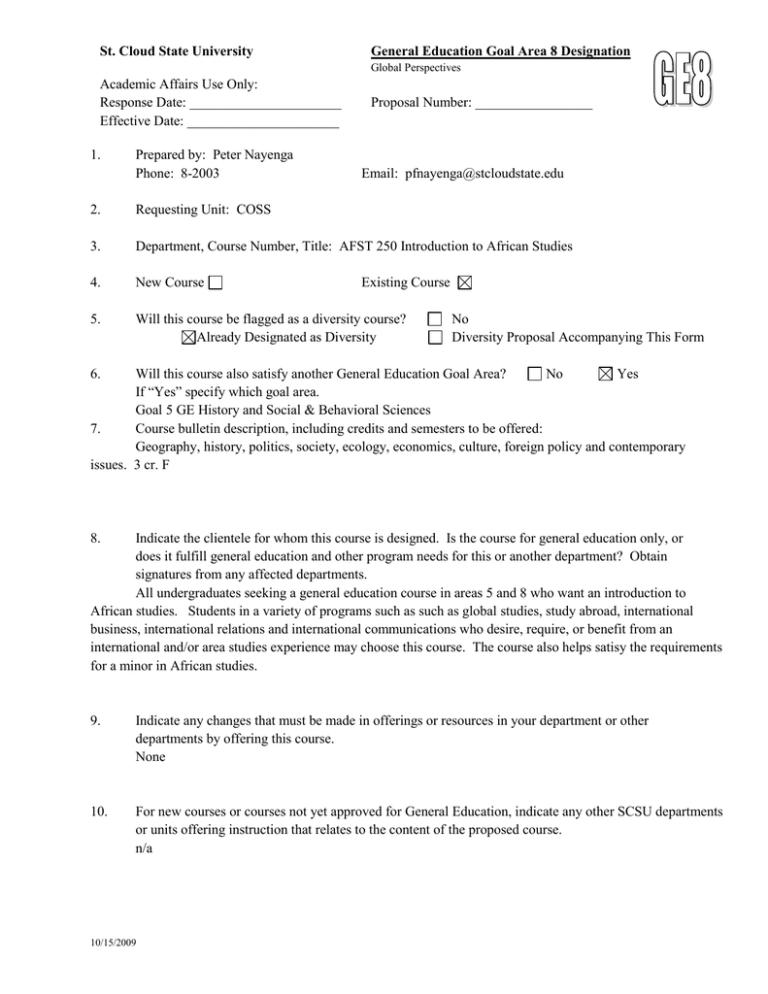
St. Cloud State University General Education Goal Area 8 Designation Global Perspectives Academic Affairs Use Only: Response Date: ______________________ Effective Date: ______________________ 1. Prepared by: Peter Nayenga Phone: 8-2003 Proposal Number: _________________ Email: pfnayenga@stcloudstate.edu 2. Requesting Unit: COSS 3. Department, Course Number, Title: AFST 250 Introduction to African Studies 4. New Course 5. Will this course be flagged as a diversity course? Already Designated as Diversity Existing Course No Diversity Proposal Accompanying This Form 6. Will this course also satisfy another General Education Goal Area? No Yes If “Yes” specify which goal area. Goal 5 GE History and Social & Behavioral Sciences 7. Course bulletin description, including credits and semesters to be offered: Geography, history, politics, society, ecology, economics, culture, foreign policy and contemporary issues. 3 cr. F 8. Indicate the clientele for whom this course is designed. Is the course for general education only, or does it fulfill general education and other program needs for this or another department? Obtain signatures from any affected departments. All undergraduates seeking a general education course in areas 5 and 8 who want an introduction to African studies. Students in a variety of programs such as such as global studies, study abroad, international business, international relations and international communications who desire, require, or benefit from an international and/or area studies experience may choose this course. The course also helps satisy the requirements for a minor in African studies. 9. Indicate any changes that must be made in offerings or resources in your department or other departments by offering this course. None 10. For new courses or courses not yet approved for General Education, indicate any other SCSU departments or units offering instruction that relates to the content of the proposed course. n/a 10/15/2009 11. Courses designated as General Education are included in the assessment plan for the Goal Area(s) for which they are approved. Courses for which assessment is not included in the annual GE assessment report for two years will be removed from the General Education Program. The Requesting Unit understands and recognizes the above conditions. 12. Provide a concise explanation of how the following goal is a “significant focus” of the proposed course. Goal Area 8: Global Perspectives Develop a comparative perspective and understanding of one’s place in a global context. Through the examination of African topics that have a global component, students will acquire a familiarity with major events and figures as studied via different human societies and behaviors. The student will also develop skills in critical reading of both primary and secondary sources, in research, in the comprehension of textual and lecture material, in class discussion, and in the composition of essays. 13. In order for a course to be designated as fulfilling Goal Area 8, it must address at least 4 of the 5 student learning outcomes (SLOs) below. Check the SLOs below that are focused on in the proposed general education course. 1. Explain how they are connected and related to people elsewhere in the world. 2. Describe similarities and differences among global places and populations. 3. Analyze how political, economic or cultural elements influence relations among the world’s states, peoples, or societies. 4. Analyze specific international issues and propose and evaluate responses. 5. Articulate a vision of their individual roles and responsibilities in a common global future. 14. Discuss how each Student Learning Outcome checked above is achieved in this course. (Note: Although descriptions of typical assignments or types of assignments may be part of this discussion, it is not appropriate to submit copies of actual assignments.) Students are required through written and oral course work, i.e., instructor generated examination questions, student generated theses (papers), and student oral presentations to: 1) explain how they are connected to people in Africa and how this interconnects with the world, through analysis of trade, art, literature and scientific exchange. 2) describe the differences and similarities of the demographic and geographic profiles of Africa and how this knowledge enhances understanding of global issues. Students will demonstrate this ability by charting maps and graphs as well as utilizing data as evidence to corroborate their findings. 3) analyze how political, economic or cultural elements in Africa influence relations among the world’s states, peoples, or societies. Students will demonstrate this ability by addressing issues such as religious differences, disputes over land and water rights, trade disagreements, and linguistic and racial differences. 10/15/2009 4) analyze how seemingly specific Africa issues influence global affairs and propose and evaluate responses. Students will demonstrate this by analyzing such issues as environmental degradation, mineral and oil exploration issues remaining from European colonial domination and Muslim-Nativist interaction. 15. List or attach the Course Outline (adequately described and including percentage of time to be allocated to each topic). Curriculum Committees may request additional information. Topics larger than 20% need to be broken down further. Indicate in your course outline where the Student Learning Outcomes checked above are being met. 5% Introduction set the course requirements and format, and delineate the physical area to be studied 15% Land forms, climate and resources of Africa establish the physical features, climate, and resource base of the area 20% The heritage and background of Africa examine the temporal processes of change in East Asia and consequent important events, persons, and concept 20% The humanities and patterns of communication in Africa develop an appreciation for the aesthetic and creative aspects of Africa life in language, literature, art, music, etc 20% Social institutions in Africa understand the characteristics of social institutions (such as education, religion, family, etc.) in Africa, the relationships among the social institutions, and the ways they shape individuals' lives. 15% Africa in the contemporary era explore a variety of contemporary issues/challenges in Africa; social transformations of African cultures, peoples, and societies; and social forces that promote those changes. 5% Conclusion assess and reflect on the learning accomplished in the course. Discuss further learning and growth. 10/15/2009
